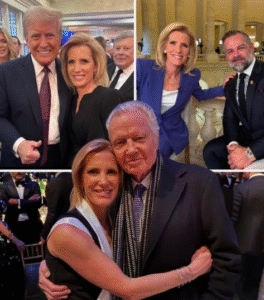A Glimpse into the Personal World of Laura Ingraham
Laura Ingraham is a name that resonates across the American conservative media landscape. As the host of The Ingraham Angle on Fox News, she is known for her sharp commentary, unwavering political stance, and a voice that commands attention. But behind the camera, beyond the headlines and soundbites, lies a personal story marked by resilience, complexity, and quiet transformation.
Born on June 19, 1963, in Glastonbury, Connecticut, Laura Anne Ingraham grew up in a modest household shaped by working-class values and immigrant roots. Her mother, Anne Caroline Kozak, was of Polish descent, and her father, James Frederick Ingraham III, had Irish and English ancestry. These cultural threads wove a foundation of discipline and grit that would later define her approach to both life and career.
Ingraham’s early academic path was steeped in intellectual rigor. She studied English literature and Russian at Dartmouth College, graduating in 1985. Her fascination with language and political philosophy led her to the University of Virginia School of Law, where she earned her Juris Doctor in 1991. Before entering media, she clerked for Supreme Court Justice Clarence Thomas—a prestigious role that signaled her deep alignment with conservative legal thought.
Yet Laura Ingraham’s journey into the public eye was not a straight line. She began her media career in the mid-1990s, hosting programs on MSNBC and CBS before finding her long-term home at Fox News. Her rise was fueled not just by her intellect, but by her unapologetic style—one that often polarized audiences but rarely went unnoticed.
Despite her public success, Ingraham’s personal life has been marked by challenges that rarely make headlines. In 2005, she was diagnosed with breast cancer—a moment that shifted her perspective and tested her strength. The diagnosis came at the height of her radio career, and she underwent surgery and treatment while continuing to broadcast. “I don’t want to be identified as a cancer person,” she told C-SPAN, “but I’m glad I asked for prayers… I felt so blessed for the last several months”. Her openness about the experience inspired many, and she used her platform to advocate for early detection and resilience.
Family, too, has been a source of both love and tension. Ingraham is a mother to three adopted children—two from Russia and one from Guatemala. Her decision to adopt was deeply personal, rooted in a desire to provide love and stability beyond biological ties. She has spoken about the joys and challenges of motherhood, often emphasizing the importance of faith, discipline, and tradition in raising her children.
However, her relationship with her own family has not always been smooth. Public reports have highlighted a strained dynamic with her brother Curtis, who has criticized her political views and accused her of being intolerant. These tensions reveal the emotional cost of public life, especially when personal beliefs collide with familial bonds. For Ingraham, maintaining her convictions has sometimes meant weathering personal fallout—a reality that underscores the complexity of her character.
Romantically, Laura Ingraham has never married, though she has been linked to several prominent figures over the years, including political commentator Dinesh D’Souza and economist Lawrence Summers. Her decision to remain single has sparked speculation, but she has always maintained that her focus on career, family, and faith leaves little room for compromise. In a world that often equates fulfillment with partnership, Ingraham’s path is a reminder that independence can be its own form of completeness.
Faith plays a central role in her life. A devout Roman Catholic, Ingraham has spoken openly about how her beliefs guide her decisions, both personally and professionally. Her conversion to Catholicism as an adult was a turning point, deepening her commitment to values she sees as under siege in modern culture. Whether discussing immigration, education, or family policy, her commentary is often framed through a moral lens shaped by her religious convictions.
Yet for all her public certainty, there are glimpses of vulnerability—moments when the polished exterior gives way to something more introspective. Her battle with cancer, her adoption journey, and her reflections on motherhood reveal a woman who has faced profound questions about identity, purpose, and legacy. These experiences have softened some of her edges, adding depth to a persona often caricatured in political discourse.
Ingraham’s home life is intentionally private. She resides in McLean, Virginia, in a house surrounded by trees and quiet—a sanctuary from the noise of television studios and political arenas. Friends describe her as fiercely protective of her children and deeply invested in their education and well-being. Her days are structured, her routines disciplined, and her boundaries firm. In a world that demands constant visibility, she has carved out a space where she can simply be Laura.
Her critics are many, and her controversies frequent. But to understand Laura Ingraham is to look beyond the headlines and into the quieter chapters of her life—the ones written in hospital rooms, adoption centers, and family kitchens. It is to see a woman who has chosen a path of conviction, often at great personal cost, and who continues to navigate the tension between public influence and private truth.
Ingraham’s story is not one of perfection, nor is it meant to be. It is a story of grit, transformation, and the enduring search for meaning in a world that rarely offers easy answers. Whether you agree with her politics or not, her personal journey offers a glimpse into the emotional terrain behind the spotlight—a reminder that even the most public figures carry private burdens, and that strength often grows in the shadows.



